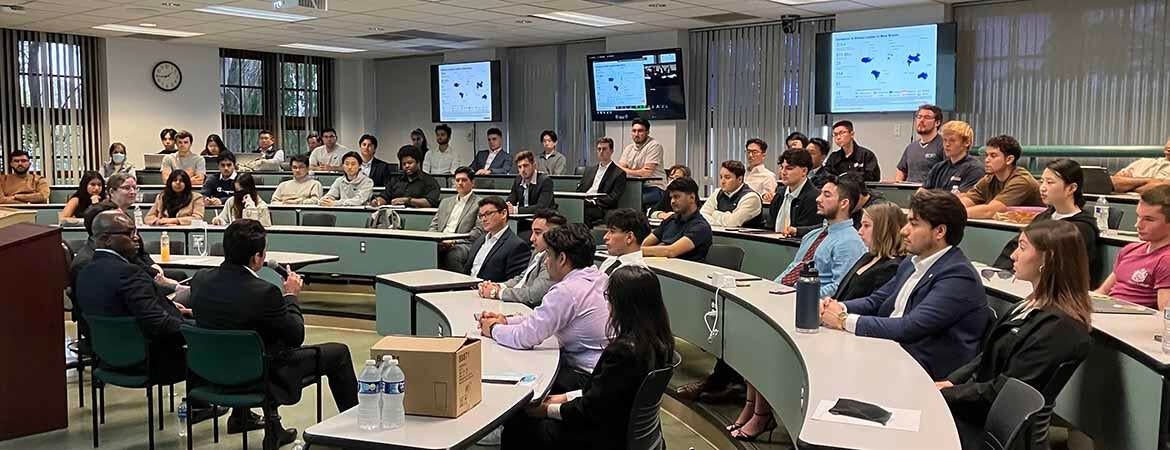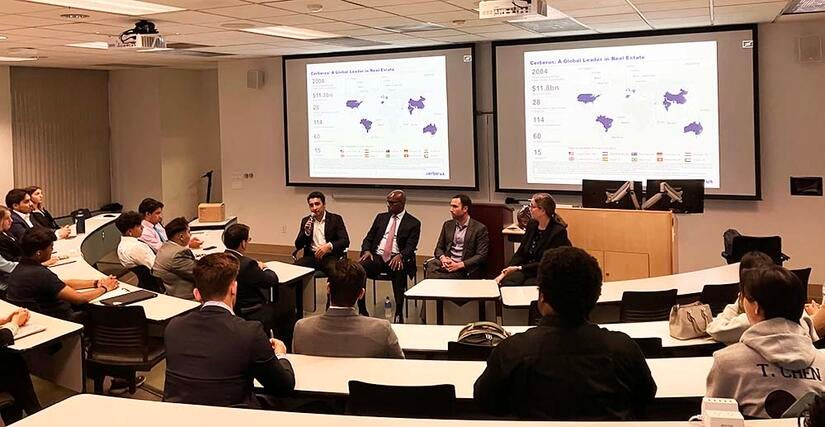
Work hard, study the historical data, lean into the research, consider all the scenarios and variables – and even then, be aware that the real estate investment market can surprise you.
These were some of the insights shared with students in the UC Investments Academy during a presentation on the Riverside campus by a team from Cerberus Capital Management, which has $60 billion in assets under management worldwide.
“You have to be disciplined. You've always got to be thinking of the unknowns and protect yourself. And never go to bed thinking, ‘I’m smarter than the market.’ Because you are not,” said Doston Bradley, managing director on the investor relations team at Cerberus.
The event was organized through the UC Investments Academy, which aims to connect University of California students, especially those from backgrounds underrepresented in the finance industry, with leading financial services firms. This was the 10th UC Investments Academy presentation, but the UCR event was the first to be held in-person, with participants from across the UC system also joining online.
Bradley was joined by Tyler Rothenberg, a managing director for Cerberus’ U.S. real estate team, and Luis González, associate in real estate equity for Cerberus.
For more than hour – and long after the official presentation ended – the investment professionals shared advice ranging from the personal to the professional, while also giving a glimpse into the world of alternative investing.
‘A story behind every deal’
Rothenberg explained at a high level how private equity investment works, starting with raising funds, finding investment opportunities across the globe, and then analyzing opportunities. The aim is to generate 20% annualized returns, which would double the return in five years. This involves examining all the variables – which could include mortgage rates, COVID shutdowns, or international military actions.
Rothenberg said students could practice their valuation skills by studying the real estate market all around them.
“Going down the street, you see offices you see hotels, schools, industrial – there's a story behind each deal,” he said. “So, if you know enough about rents and how net operating income is calculated and what you think is going to happen to that asset, you can simply go into Excel and start projecting that out.”
González confirmed the importance of learning the technical tools of the trade to work harder and smarter.
“I am constantly trying to find ways to be faster at my job,” he said, noting that his attitude came from his childhood. Both of his parents immigrated from Mexico, and he had to learn English from scratch in kindergarten.
“From early on, what my parents ingrained in me was that whatever you do, whether you want to be a boss or a janitor or whatever, be the best,” Gonzalez said. “That also means putting your best foot forward and also respecting everyone around you, because ultimately that will help elevate you throughout life.”
Bradley confirmed the importance of working hard. Noting that his father mowed lawns for a living, he said he had no connections to finance growing up. As an African American, a demographic underrepresented in finance, “statistically I should not be here,” he said. He had to make connections and build a network – which he advised students to do, too.
“You have to believe in yourself,” he said. “There’s no way you will get up here to interview with us if you don't believe in yourself. If you don’t believe in yourself, why should we believe in you?”
Bradley encouraged students to explore opportunities such as The Consortium for Graduate Study in Management, which provides tuition and fellowships to underrepresented minorities in business education.
Great ROI for students
Professor Jean Helwege, Anderson Chair in Finance, said that the time invested by the Cerberus team had a great payoff for students – and hopefully for Cerberus as well.
“The way to get our students on the radar of these companies and land them jobs is to make connections to industry and raise the awareness of the great talents of our UCR student population,” Helwege said. “Cerberus learned as much about our students as our students learned about them. Hopefully, we can stay connected with Cerberus and build a pipeline of future employees to the company.”
George Maalouf, a junior studying business administration in finance with an economics minor, said he enjoyed gaining insights into methods of valuation. He also appreciated Bradley’s emphasis on building a network, “particularly about his story of not knowing anyone within the finance industry but having the drive to work incredibly hard and it eventually paying off.”
Leonardo Targia, who is pursuing his MBA with a concentration in finance in the A. Gary Anderson Graduate School of Management, said he appreciated the opportunity to build his professional network.
“As students, it's crucial that we make the most out of these events and leverage all the opportunities available to us,” Targia said.
